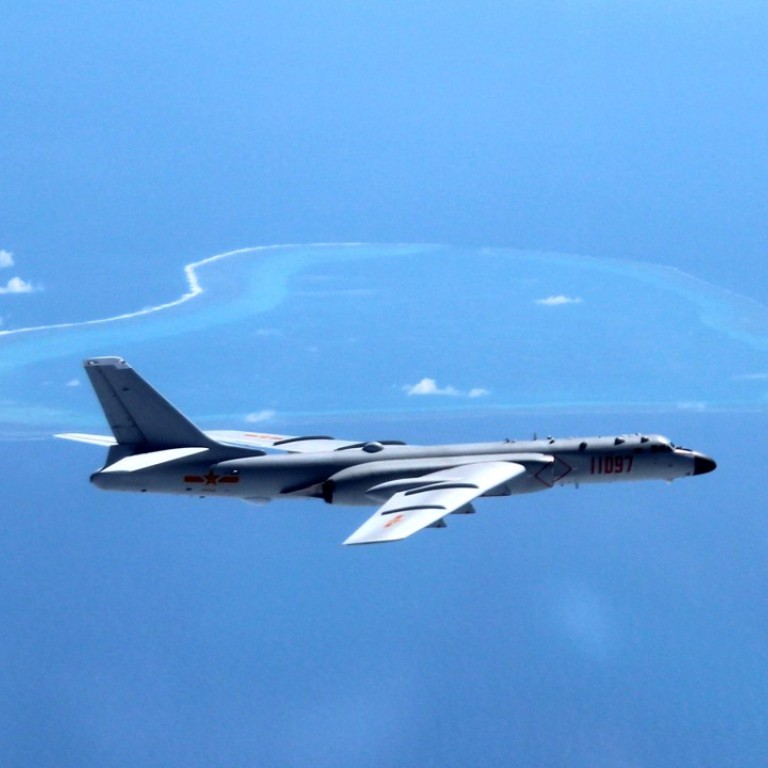
Duterte ‘not abandoning’ court victory against Beijing over South China Sea areas, says spokesman
Philippine president waiting for ‘proper time’ to address disputed areas claimed by Beijing in his country’s exclusive economic zone
Philippine President Rodrigo Duterte told Vietnamese Prime Minister Nguyen Xhan Phuc on Friday he is not abandoning Manila’s 2016 arbitral award against China over features in the South China Sea, his official spokesman said.
According to Harry Roque, Duterte assured Phuc during a bilateral meeting in Singapore ahead of their participation in a regional summit this weekend that the International Court of Arbitration’s decision “will be addressed at the proper time”.
“He made it very clear to a head of state that he recognises the gains of the arbitral award and that he will refer to the arbitral award in due course,” Roque said in a news briefing. “He wants the totality of the West Philippine Sea controversy settled under the rule of law and pursuant to the binding norms of the UN Convention on the Law of the Sea.”

The Philippines calls portions of the South China Sea which it claims the West Philippine Sea.
The Hague-based court ruled in July 2016 that China’s claims have no legal basis and that it violated the Philippines’ sovereign rights in its 200 nautical mile exclusive economic zone. China continues to reject the arbitration award.
Along with Vietnam and fellow Asean countries Brunei and Malaysia, the Philippines has competing claims against Beijing in the South China Sea. The busy international sea lane is potentially rich not only in marine resources but also oil and gas.
Duterte, who came to power in mid-2016, is facing criticism for allegedly favouring investment and economic gains from China over the Philippines’ rights in the South China Sea. The Philippine leader has said Beijing warned of war if Manila insists on enforcing the award.

Despite the arbitral decision, China completed reclaiming seven features in the area, including those adjudged as already being within Philippine territory, and continues to fortify them.
With Duterte’s shift in strategy in dealing with China from his predecessor’s more assertive stance, Vietnam is now the only vocal critic of China’s activities in the region.
“I hope [Philippine Supreme Court] Justice [Antonio] Carpio and all the critics of President Duterte will now keep quiet because this is now a statement of the Philippine president made to another head of state, that he has not abandoned, he is not reneging, he is not relinquishing, he is not in any way ignoring the arbitration [award] and he considers it as a binding arbitral decision in favour of the Philippines,” Roque said.
Roque said Phuc praised the Philippines’ handling of the issue in general with China, quoting the Vietnamese leader to have said at their meeting, “We will learn from [Duterte’s] handling of China,” and “President [Duterte] handled China very well.”

The arbitration award issue was brought up in the two leaders’ talks after Phuc sought the Philippines’ support in its joint submission with Malaysia for an extended continental shelf in the South China Sea, Roque said. The joint submission was filed with the Commission on the Limits of the Continental Shelf in 2009, and remains unresolved.
Roque said he is not certain, though, whether Duterte will give the same assurance about the arbitration award to other Asean leaders when he meets them formally on Friday evening and Saturday.
He said he is not expecting China to react negatively about this particular discussion between Duterte and Phuc, saying, “[China and Vietnam] have their own bilateral discussions ongoing.”
Roque said the two leaders also agreed that a Code of Conduct in the South China Sea is important as a tool to “assert Asean’s unity and to have a louder voice against China”.

